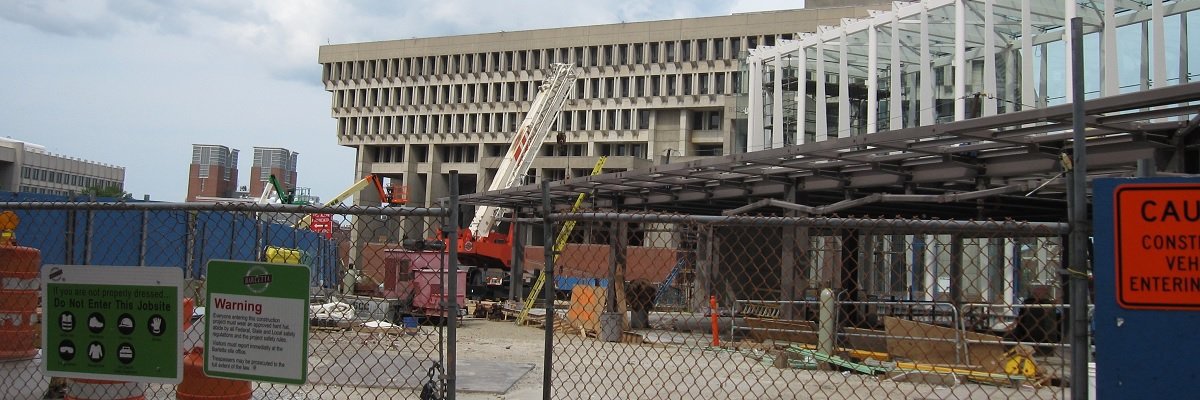One report of wage theft made to the city of Boston and recently released through a public records request sheds light on how businesses get away with it.
Within Boston’s construction industry, the first step is to avoid accountability. As the complaint to the city makes clear, “when asked, the workers typically don’t know who they work for.” They know their immediate supervisor, often a subcontractor four or five times removed from the General Contractor, but not the name of any of the contractors higher in the chain of command.

In nearly any other business that wouldn’t make sense - people generally know who they work for. But, as Manny Gines, organizer with the New England Regional Council of Carpenters explains, this is common in construction.
“In drywall we see it a lot,” he says. “The subcontractor doesn’t do the job, he subcontracts it to a “suitcase” contractor. We call him a suitcase contractor because he doesn’t actually own a business, he operates out of the back of his truck.”
This is what the complaint refers to as a “sub-sub/labor broker set-up.” It removes responsibility for wages as far as possible away from the actual project manager.
Here’s how it works: the General Contractor subcontracts a portion of the project to someone who then subcontracts again, and then subcontracts again and again, and at some point the workers won’t actually know who runs the project - and if they don’t get paid, there’s nowhere to turn for assistance.
The workers often only know the subcontractor they work for “by his first name or nick name,” says Gines, adding that the subcontractor “also knows he is breaking the law,” and doesn’t want to be identified.

Gines, a Boston labor organizer for ten years, predicts what happens next. He notes that a lot of the subcontractors hire workers on a casual basis. “And then, when they get to the end of the project, they say to the workers, I can’t pay you until I get your social security numbers.” Workers without social security numbers won’t get paid.
Another tactic to avoid paying workers, says Gines, is to delay paying workers until the project is finished, at which point the subcontractor no longer needs the labor and often refuses to pay.
The complaint continues about a little-known form of wage theft called independent contractor misclassification.

Even when the workers are paid, when they are classified incorrectly as independent contractors instead of employees they are not protected by workers compensation if they suffer on-the-job injury, and the informal nature of the pay means the employer has all the power.
One contractor working in Boston’s MetroWest suburbs, who asked to remain anonymous in order to avoid retaliation from his employer, discussed trying to receive pay for all the hours he’d worked in a week.
Noting that he would often begin work early in the morning only to find his employer wouldn’t begin counting his hours until 9:00, he said that if he really fought for it, the employer “might give me that hour in the morning, but he’ll squeeze it out of me somewhere else. I understand everyone’s trying to make money out there, but he’s making money hand over fist.”
Adds Gines, “The General Contractors act like the don’t know what’s happening, but they keep using the same subcontractors over and over again.”
The United States Department of Labor agreed with Gines’ assessment last week when they announced that a Lunenberg-based construction company, Force Corp., had partnered with a Framingham-based subcontractor to set up a similar labor scheme to the one described in the Boston complaint. Force Corp has been ordered to pay out nearly $2.4 million in back wages to 478 workers.

And yet while workers and regulators know first-hand the vast extent of the wage theft problem in Boston’s construction industry, perhaps the most telling aspect of the wage theft problem is the complaint itself.
The complaint was recently released in response to a public records request which sought all complaints of wage theft made to the City of Boston from June 2015 through July 2016. And while wage theft is commonplace in Boston’s construction industry, this was the only complaint made to the city during those thirteen months.
For every $2 million in stolen wages in Massachusetts, the Attorney General recovers about $14,000. Wages are also commonly recovered through private lawsuits, but getting away with wage theft has allowed certain businesses in the city to profit at the expense of their employees.

Says the MetroWest subcontractor, “It hurts the country as a whole because of [decreased] tax revenue and it raises workman’s comp and insurance costs across the board. There’s a trickledown effect, and unless you take a step back and look at it, you really don’t see the whole picture.”
Or, as Gines notes, “even when these contractors get a citation, they still make a profit.”
Read the full complaint embedded below, or on the request page.
Experienced wage theft yourself? Contact the author at sparksbriant@gmail.com
Image via Wikimedia Commons




